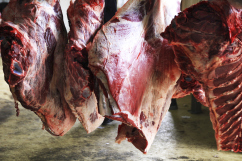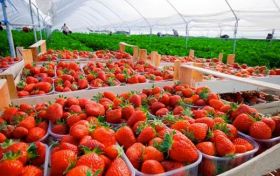Defra
New slaughter regulations from Defra regarding the killing of poultry have raised concerns over the welfare of the birds with the British Veterinary Association (BVA).
The organisation is apprehensive of Defra’s decision not to include stunning parameters in the legislation when it involves poultry being slaughtered ‘in accordance with religious rites’. Despite these concerns, BVA, or the most part, has applauded the Welfare of Animals at the Time of Killing (WATOK) Regulations.

The European Food Safety Authority (EFSA) has worked hard to evaluate parameters for electrical waterbath stunning of poultry, which has led to European legislation including rules on stunning when it comes to animal welfare at slaughter.
There are fears that if rules are not clearly stated and implemented in electrical waterbath stunning for birds killed ‘in accordance with religious rites’, then the animals will be immobilised rather than stunned when it comes to slaughter. This would result in the animal still being conscious at the time of slaughter.
“In the last year we have seen headlines about the inhumane treatments of animals at slaughter and, while these new WATOK regulations are strong in many areas, we are concerned that the omission of specific parameters for electrical waterbath stunning leaves some poultry vulnerable to ineffective stunning,” explained BVA president Sean Wensley.
The BVA believes that European legislation should be practised throughout WATOK, with fears that taking away the requirements in electrical waterbath stunning may also remove the legal guarantee for effective stunning before slaughter.
In response to these issues, the BVA has voiced its concerns in a letter to Defra, seeking clarification as to how it will be ensured that the bird is stunned before the time of death.
“We have written to Defra outlining our concerns about this gap that undermines the science the regulations are built upon,” continued Wensley.
“It is difficult to see how effective stunning can be assured for all poultry if parameters are not set when poultry are killed in accordance with religious rites. Slaughtermen, official veterinarians and animal welfare officers in abattoirs are not able to tell the difference between birds that have been effectively stunned and those that are just electro-immobilised, thus compromising the animal welfare standards that these regulations are being put in place to protect.”
New funding released by Defra will boost nine horticultural agri-tech projects support growth in agri-science sector
Several fresh produce research projects will receive £12.1 million in government funding, it has been announced.

Out of the 15 agri-tech Catalyst Award winner, nine are within horticulture and five are specifically centred around fresh produce.
Defra said the investment will help support growth in the agricultural science and technology sectors in the UK.
The winning horticulture agri-tech projects were:
– ‘New strawberries optimised for growing without soil’, run by East Malling Research, Agrovista, Botanicoir, CPM Retail and Sainsbury’s.
– ‘Antimicrobial technology to control disease in potato production’, run by, Advanced Pest Solutions, Agrico, Branston, McCain Food, Science and Advice for Scottish Agriculture (SASA) and Scottish Agronomy.
– ‘Using light to extend the shelf-life of fresh produce’, run by Finlay Flowers, Adas, Lambda Photometrics, May Barn Horticultural Consultancy, North Bank Growers, Nutricycle, University of Nottingham and Wight Salads Group.
– ‘An automated system for precision application of fertiliser and plant growth compounds’, run by Growhow, Adas, Chris Harry-Thomas Consulting, Hill Court Farm Research, Patchwork Technology, Precise Crop Nutrition and Syngenta.
– ‘Developing technology for an organic natural based pesticide’, run by Hockley International, Almac Sciences and Bangor University.
– ‘Improving efficiency and reducing environmental harm of fertiliser production’, run by ITM Power, BPE Design and Support, Fera, University of Sheffield and Waitrose.
– ‘Increasing the efficiency and quality of strawberries grown without soil’, PlantWorks, Agrovista, Berry Gardens and East Malling Research.
– ‘Protecting peas and beans from beetles without blanket insecticide spraying’, run by Processors and Growers Research Organisation, BASF, Exosect, Oecos and Rothamsted Research.
– ‘Optimising “big data” to drive improvements in crop production and utilisation’, run by Produce World and Cranfield University.